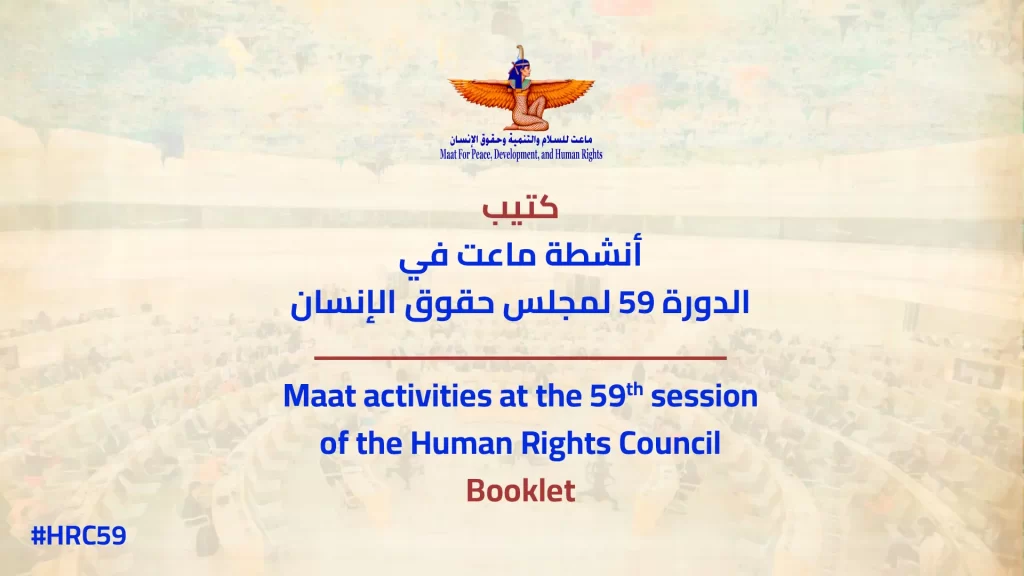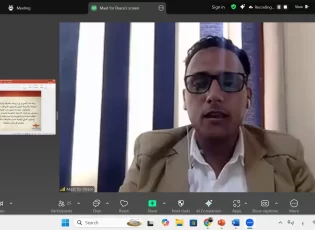The Maat Foundation issues a report on the impact of the Corona virus on the conditions of refugees in the Middle East
Aqeel: There is an international failure in dealing with the crisis of refugees and internally displaced persons in light of the Corona crisis
Sherif Abdel Hamid: Coronavirus has made the situation of refugees and internally displaced persons more difficult
The Maat Foundation for Peace, Development and Human Rights issued a report entitled “The implications of the Coronavirus on refugees and internally displaced persons in the Middle East,” dealing with the suffering caused by the Corona pandemic on the economic and social aspects of citizens' lives around the world, due to the restrictions imposed by different governments, from suspending each and part of the Citizens' lives or the broad quarantine that has been implemented to prevent the outbreak of the epidemic. The report explained the negative effects resulting from these restrictions on the citizens of the world. The (Covid-19) epidemic, for example but not limited to, has resulted in 25 million people losing their jobs, according to the International Labor Organization. The pandemic has cast a shadow over entire societies. In particular, refugee communities were among the most affected, given the vulnerability and vulnerability that afflicts this group in times of humanitarian crises and disasters, especially in low and middle-income countries, which currently host more than 85% refugees around the world. The report stated that the number of refugees around the world is estimated at 79.5 million displaced, of whom 18 million are in the Middle East region, as a result of the high rate of armed conflicts and humanitarian crises in those countries, and that the Corona pandemic has exacerbated the suffering of refugees in these areas.
The report indicated that, as of the middle of the current year 2020, nearly 80 million women, children and men in the world were forced to leave their homes to become refugees or internally displaced persons, and it may be most surprising that there are 10 million of these people who fled their homes in 2019 alone, Of course, those numbers have increased with the increase in the frequency of regional and international conflicts and conflicts, especially conflicts in the Arab region, which began to flare with the entry of new parties into the ongoing conflicts, and regional and international powers intervene in those conflicts, and some Arab countries have become a theater of operations, and a land ready for proxy war. And coinciding with all this complexity and entanglement, the emergence of a virus that threatened the entire world, and the Corona pandemic - unfortunately - posed an additional threat to refugees and internally displaced persons, who are among the most vulnerable.
In this context, Ayman Aqil, head of the Maat Foundation, said that the negative effects of the new Corona virus on refugees in the Middle East have led to high unemployment rates among refugees in the Eastern Mediterranean Region, along with a decrease in the number of refugee children enrolled in education, and limited access for refugees to clean water and sanitation. In addition to the impact of the epidemic on the right to food in refugee camps and on some vulnerable groups such as women.
Aqeel added that the outbreak of the new Corona virus has led to an unprecedented increase in unemployment rates among refugees in the countries of the Middle East. In Lebanon, which hosts a million and a half refugees of both Syrian and Palestinian nationalities, 50% men lost their jobs, in addition to the loss of about 100% of women to jobs who were They turn it on before the coronavirus restrictions are imposed. The vast majority of these worked in low-income jobs that were not part of the formal economy, as construction workers, electricians, cleaners or farmers, and Aqeel emphasized that the situation before the pandemic of the new Corona virus was slightly different, but the situation of Syrian refugees after the pandemic worsened and became threatening Their lives, and the average debt per family amounted to 1115 US dollars, while 70% of refugees were forced to reduce their food consumption, due to the lack of funds needed to purchase food.
Aqeel said that the reality of the situation tells us that there is an excruciating international failure to contain the refugee crisis, especially with the use of “refugees” as a pressure card by some countries in the region as is happening by Turkey. We must admit that there are more than 190 countries that have failed to alleviate the suffering. A group of about 80 million refugees and internally displaced persons by mid-2020, and more than half of these refugees live in only ten countries out of 193 countries, including Palestine, Syria, Iraq and Somalia.
For his part, Sherif Abdel Hamid, Director of the Research and Studies Unit at the Maat Foundation, said that the negative consequences and effects of the spread of the new Corona pandemic affected all walks of life in all parts of the world, and it is still expected to increase the ferocity of its effects if its spread does not stop in all countries, and that one of its negative consequences is a rise Unemployment rates in the world, as well as poverty rates, the number of working children, the high number of missing persons, and the bond.
Abdul Hamid added that the Corona virus has made the conditions of refugees and internally displaced persons more difficult, and their conditions are already deteriorating, by the nature of what the Middle East region has become in terms of being a line of fire and a region of regional and international alliances, and conflicts have fueled due to the presence of some subversive and regional powers such as Iran, Turkey and Qatar in the region, and their support for some Terrorist groups at the expense of national forces and armies, which increased the suffering of refugees between the anvil of the exceptional circumstances imposed by the Corona pandemic, and the hammer of conflicts and conflicts raging in the Middle East.
shortlink: https://maatpeace.org/en/?p=26998












